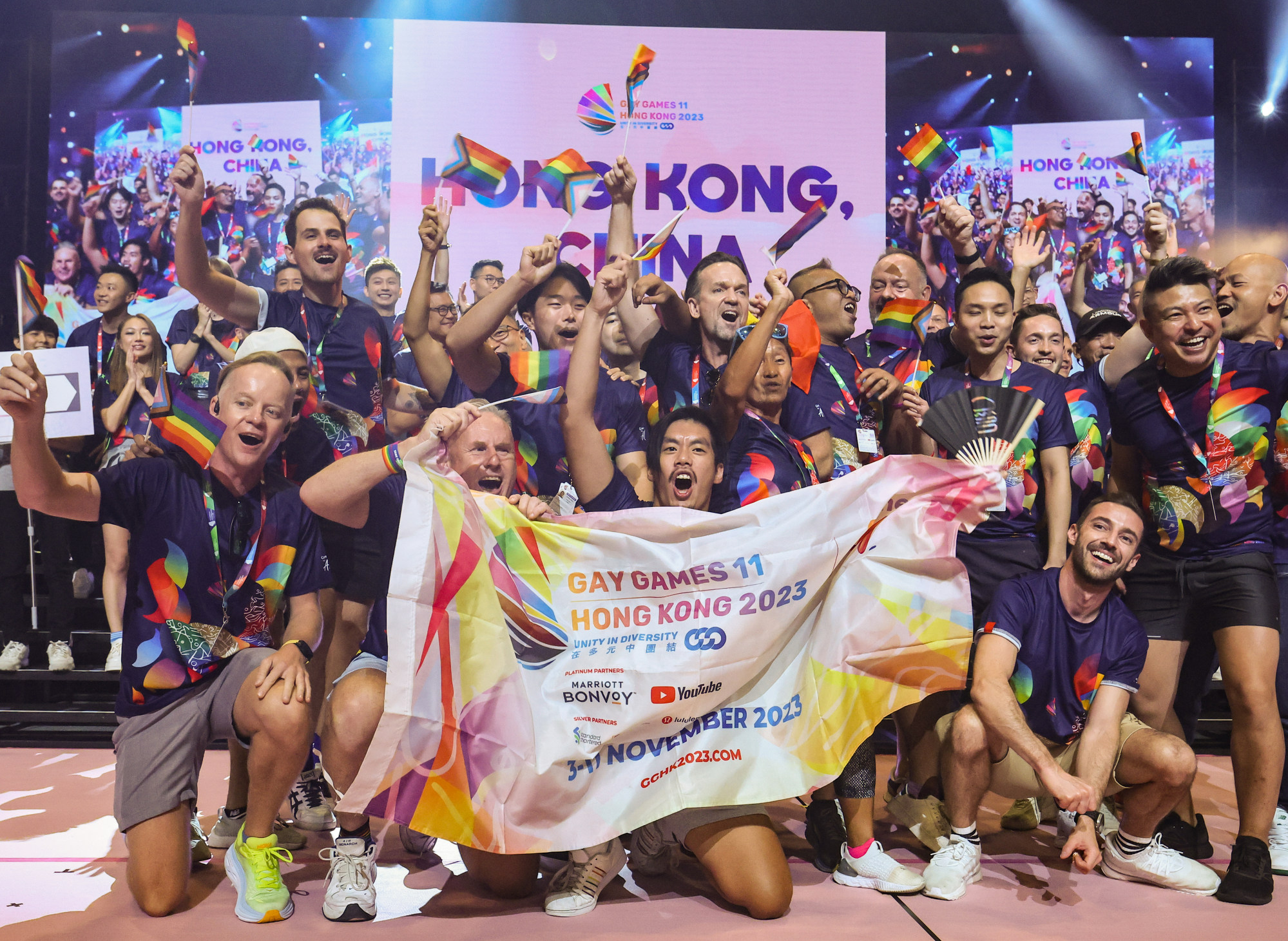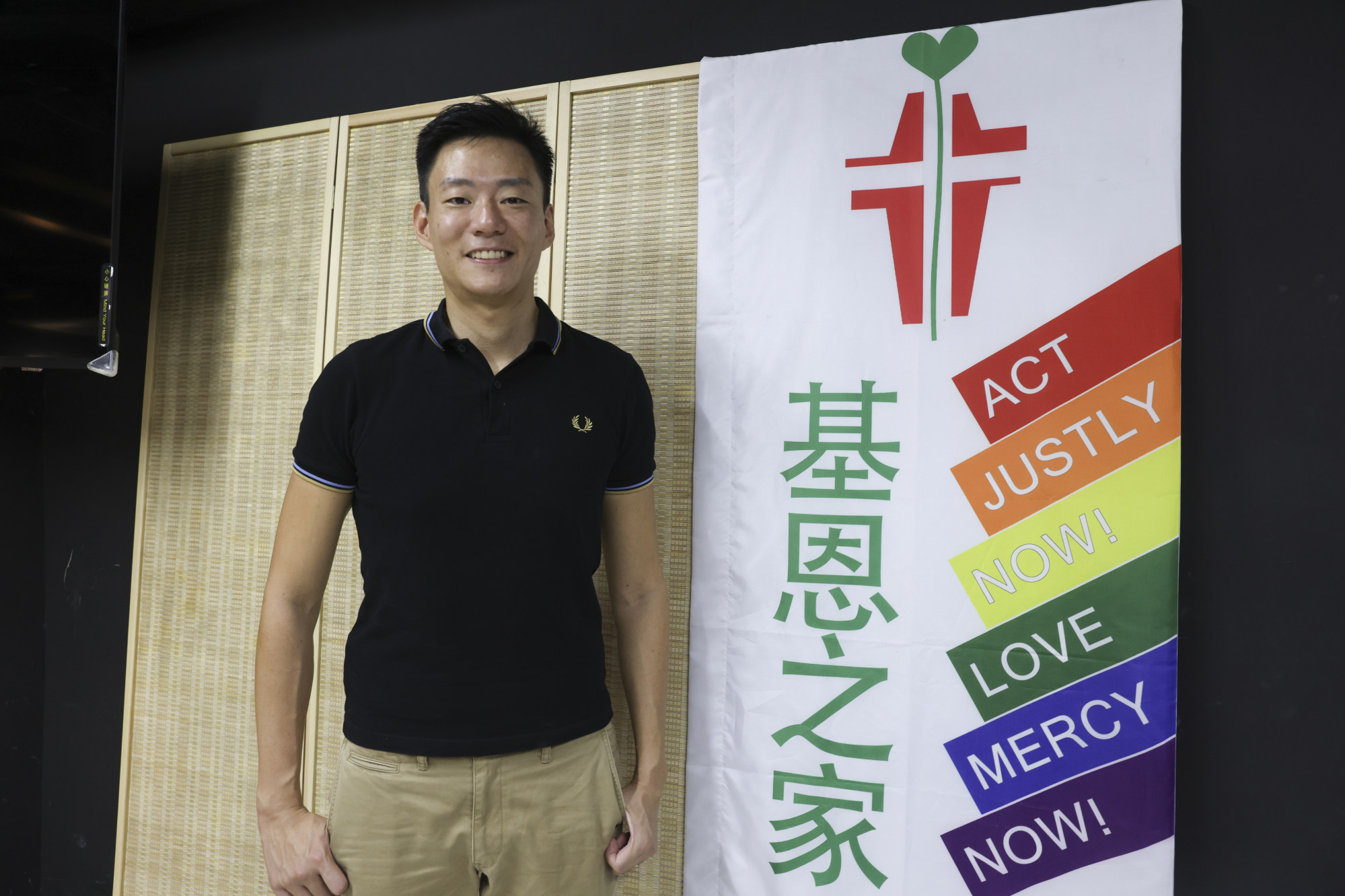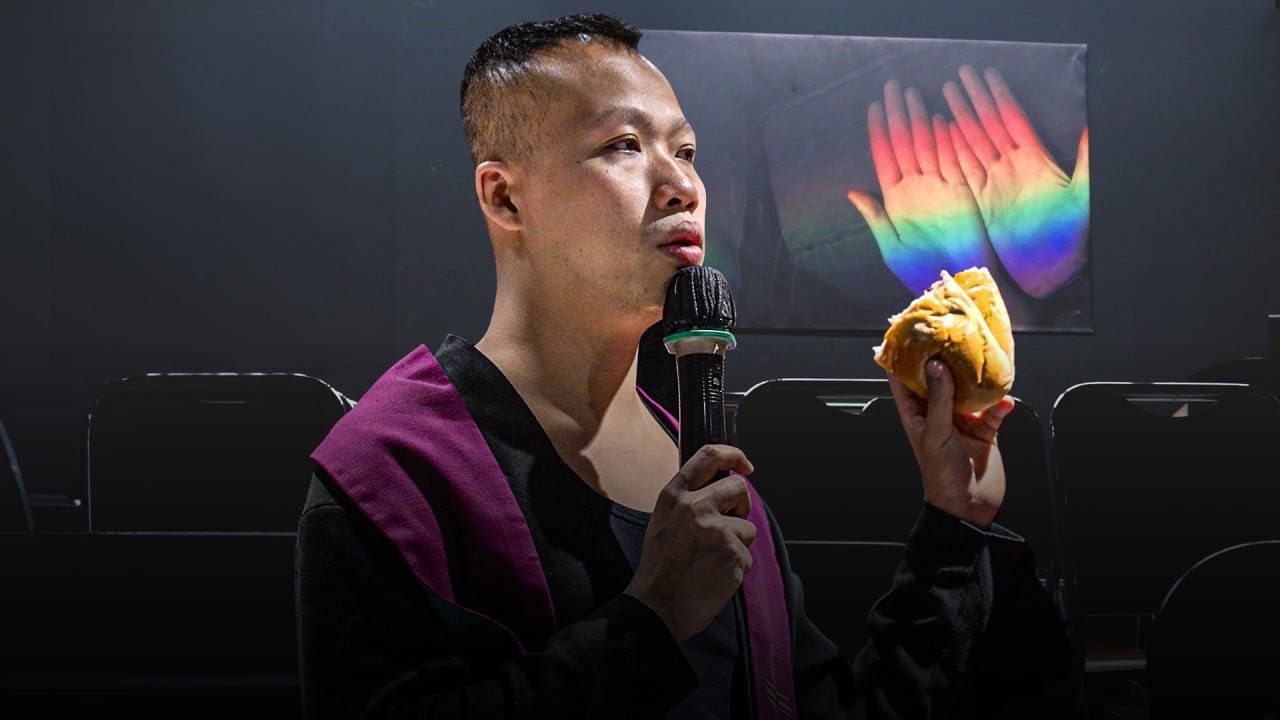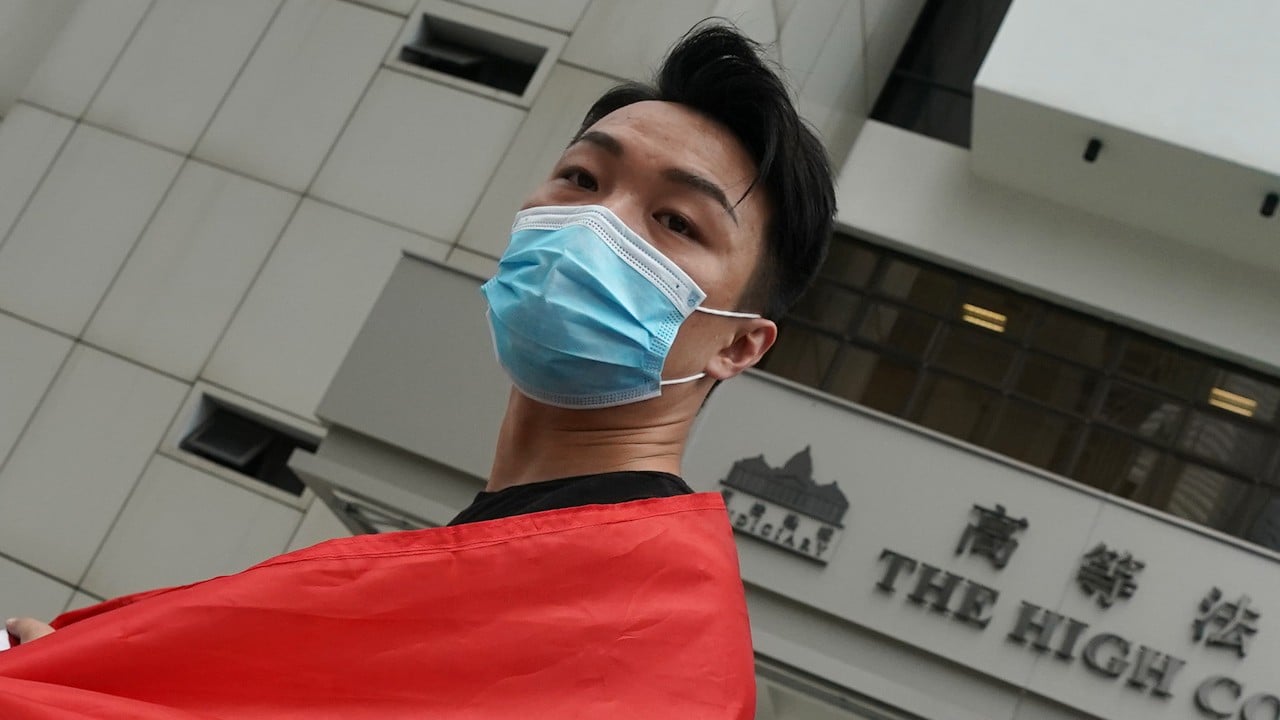
How Hong Kong’s Gay Games stumbled in sprint towards finishing line but still made ‘history’
- Delayed by Covid, hobbled by evaporating government support and embroiled in political controversy, Gay Games overcame huge hurdles to launch at weekend
- While some lawmakers and critics say event will undermine traditional Chinese family values, organisers call it milestone in long fight for recognition
Hongkonger Ally Chan Suet-yu has been open about her sexual orientation with her friends, classmates and colleagues, but the 27-year-old has so far refused to tell her parents she is a lesbian.
“I know that they won’t accept me,” said Chan, who left her job as a financial analyst to pursue a master’s degree in fine arts at Baptist University.
“This event is a big deal for Hong Kong,” said Chan, who will compete in the mahjong event. “I want to show others that we are just normal people who want to be ourselves.”

But the road to the opening ceremony in Wan Chai’s Queen Elizabeth Stadium last Saturday has been far from smooth. About 2,400 participants from 45 jurisdictions are competing across 18 events, far short of the roughly 15,000 athletes, more than 100 places and 36 sports first envisioned.
And while the economic impact of the first Games to be held in Asia will only become clear after they end on November 11, the final figure is almost certain to be well below the HK$1 billion (US$128 million) initially estimated.
Several activists have noted that the response to the event from the wider LGBTQ community itself has been muted in some quarters, citing a loss of momentum after the pandemic delayed the event by a year and Guadalajara in Mexico was named co-host due to the tough travel curbs enacted by Hong Kong. At the same time, the founder of the local organising committee, who had quit his job to work full-time on the preparations, resigned.
Many participants and rights activists have also expressed disappointment over the level of government support for the event, saying it stands in stark contrast to the enthusiasm that officials showed in 2017 when the city won the bid to host the event.

Despite these challenges, several veteran LGBTQ activists remain adamant that the Games are an important milestone in the long fight for recognition.
“Notwithstanding the detractors, overall we are seeing more people [in Hong Kong] these days have a better understanding of LGBTQ issues … and the Gay Games are definitely a part of that equation,” said Jerome Yau, vice-chair of the Pink Alliance.
Homosexuality was a long-standing taboo in Hong Kong owing to traditional Chinese and Christian values. Although gay sex was decriminalised in 1991, authorities do not officially recognise same-sex marriage and anti-discrimination ordinances do not cover sexual orientation.
But inside the courtroom, judges have handed LGBTQ couples a string of legal victories in recent years that have carved out baseline protections. Last month alone, the Court of Appeal ruled in favour of granting housing benefits to same-sex couples as well as protecting their inheritance rights.
In September, the Court of Final Appeal delivered a landmark judgment requiring the government to provide some form of legal recognition, such as civil partnership, for same-sex couples, which would include a set of “core rights”.
Azan Marwah, a lawyer who has handled a number of LGBTQ cases in Hong Kong, said that while these decisions were “barely scratching the surface” in providing full equality, there has nonetheless been “a lot of progress”.
“It illustrates that the courts are willing to protect these rights and relationships,” Marwah said. “That compares favourably with many other jurisdictions.”
While Western countries such as Canada and the United Kingdom have blazed the trail for LGBTQ rights in recent years, most countries in Asia have not followed suit. Taiwan legalised same-sex marriage in 2019 and remains the sole jurisdiction in the region to have done so.
Japan’s courts have been split on whether a ban on same-sex marriage is constitutional, and a recent government bill to protect sexual minorities against discrimination has been criticised by human rights groups, which say it fails to provide adequate protections.
It took until just last year for Hong Kong’s regional rival Singapore to decriminalise homosexual intercourse among men – lesbian sex was never covered by any legislation, an oddity in the law inherited from colonial times – but the country amended the constitution to prevent further legal challenges to issues on marriage and related policies.
Sodomy remains illegal in Muslim-majority Malaysia, and there are very few protections in neighbouring Indonesia.
In Hong Kong, the court’s growing recognition of LGBTQ rights coincides with increasing public support for them.
About 60 per cent of adults backed same-sex marriage, up from 38 per cent a decade ago, according to a survey released this year by the University of Hong Kong, Chinese University and the University of North Carolina at Chapel Hill in the United States.
Of the 1,500 surveyed, only 17 per cent opposed same-sex marriage, while the remainder held a “neutral” position on the issue.
Support is even higher among younger residents. According to a poll conducted by the Hong Kong Public Opinion Research Institute last year, 76 per cent of Hongkongers between the ages of 18 and 40 believed the government should do more to “promote acceptance and understanding” of LGBTQ people.
The wider community recognition has been reflected in the increased visibility of related organisations across the city.
Alan Hau, the deacon and executive director of the LGBTQ-inclusive Blessed Ministry Community Church, formed in 1992, recalls the initial extreme secrecy needed when taking in people kicked out of their own church or forced to keep their sexuality hidden from the public.
“Right across from Western Market there was a phone booth, and [church staff] would tell people to wait there at a specific time, and then they would bring these new people up to the church,” he said.

All that has changed and now the church seeks to be “as visible as possible”, advertising itself to the public, collaborating with local universities and expanding its services to include counselling.
In entertainment, a growing number of films by LGBTQ directors and greater access to streaming services representing a variety of views has helped to improve depictions of the community, notes Ray Yeung, filmmaker and executive director of the annual Hong Kong Lesbian and Gay Film Festival.
“A lot of the films that were shown in Hong Kong [in the 1990s] viewed the LGBT community in a negative way,” Yeung said. “They were using gays and lesbians as a joke.
“Now there is more representation … and that has helped the local audience to become more open.”
The festival was now also serving as a platform for other Asian filmmakers whose works might be censored in their own countries, he added.
The annual Hong Kong Pride Parade, first held in 2004, also returns later this month, albeit as a weekend pop-up exhibition rather than a march. In 2018, the event drew 12,000 people onto the streets, although organisers later switched to an indoor format when the pandemic struck.
Travis Kong Shiu-ki, a sociology professor from the University of Hong Kong who has spent more than decade studying the histories of older gay men in the city, said these advancements were a “relief” to those who were once “deep in the closet” when homosexuality was a criminal offence.
“It was once unthinkable for them to imagine that society would really change,” Kong said, adding the group was grateful to see the movement grow.
While recognition of LGBTQ rights has been increasing in Hong Kong, voices critical of the movement have also grown louder and fiercer in recent years.
Groups such as Family Build in Love, a Christian organisation advocating traditional family values, argue the court rulings promote same-sex marriage and will change the fabric of society.
“The idea of two princesses and two princes will greatly impact our next generation,” founder Joyce Chiu Pui-yuk said. “They are not mature enough to identify the problems behind these ideas.”
Chiu, who has been involved in anti-LGBTQ efforts for more than a decade, said more parents were approaching her with concerns as society grew more accepting of same-sex marriage.
The Games themselves have come under repeated fire. Just days before the event started, seven lawmakers, including Junius Ho Kwan-yiu and Priscilla Leung Mei-fun, along with a dozen anti-LGBTQ rights critics called on authorities to ban the Games.
Ho described the event as a “criminal activity” that spread the ideology of gay rights, and subverted traditional Chinese family values.
“We object to any Western ideology that sugar-coated its agenda in the name of diversity and inclusivity for a sports event, attempting to subvert national security,” Ho said.
Former chief officer of the Equal Opportunities Commission Josiah Chok Kin-ming urged authorities to investigate whether the Games’ source of funding came from foreign organisations and amounted to collusion with external forces, an offence under the national security law.

At the opening ceremony on Saturday, while a small group of protesters stood outside calling for the Games to be boycotted, the atmosphere inside Queen Elizabeth Stadium was electric, with an estimated 3,000 fans and athletes celebrating.
“History is being created today,” Regina Ip, convenor of the key decision-making Executive Council, said in a seven-minute speech punctuated by repeated cheers from the crowd.
Over the summer, the organisers sought to offer assurances to Games participants that Hong Kong was a safe place to visit after some foreign officials and athletes expressed concerns about falling afoul of the security law. A group of overseas LGBTQ activists called for the Games to be cancelled over human rights concerns, prompting the organisers to issue a statement denouncing “unfounded” slurs.
Unlike the committee running the simultaneous event in Guadalajara and which received the full backing from the municipal and state-level governments, the one in Hong Kong has been provided with little support from the government and instead has been forced to rely on private sources of funding and venues.

While organisers had earlier hoped that up to half of the events would be held at government venues, officials made only Queen Elizabeth Stadium available for the opening and closing ceremony, as well as for the martial arts and dodgeball competitions and gala concerts.
Four statutory bodies – the Equal Opportunities Commission, Brand Hong Kong, the Tourism Board and InvestHK – are listed as supporting organisations, but the level of backing is unclear beyond allowing organisers to use their logos.
The commission has said it supported the Games’ “mission to promote equality and inclusion”, but that it did not provide any “manpower or financial resources”. It did not send any representative to the opening ceremony.
But a number of leading companies have sent teams to the Games, including PwC, Blackrock, Accenture, Bloomberg and Microsoft.
While Ip has said she does not support recognising same-sex marriage, the political heavyweight is one of only a handful of public officials to express support for the LGBTQ community.

Speaking to the Post, Ip said government bodies such as the tourism bureau and the Mainland and Constitutional Affairs Bureau had at one time offered “considerable support” for the Games.
“Frankly, the turning point was the 2019 riots and the national security law in 2020, which triggered a backlash against the Games from some of the more conservative elements of our society,” she said, adding the event was good for Hong Kong.
When asked about its previous support for the Games, the mainland affairs bureau said commenting on the event did not fall under its purview, and directed questions to the Culture, Sports and Tourism Bureau, which gave the same response and referred inquiries to the Information Services Department.
“The Gay Games is hosted by a community organisation … The government has reminded the organiser to observe the laws and regulations in Hong Kong, regardless of whether the events are held in private venues or not,” the department said.
While organisers have remained determined throughout the controversy to hold the Games, many have also noted the muted response to the event from the LGBTQ community itself, with some feeling let down.
“My heart really goes out to all those people who have worked tirelessly on this,” filmmaker Yeung said. “It should have been a beacon for Asia, but now because of Covid and all the challenges they’ve faced … the whole thing is really a damper.”
But when asked whether the lack of government support had impacted the preparations, local public relations director David Ko said: “We’ve received the support we need to go ahead and make the Games happen.”
He noted the team had less than a year to promote the Games overseas owing to the city’s pandemic restrictions, and that many athletes from North America opted to participate in co-host Guadalajara due to its proximity.
For Ko, however, the measure of the event’s success was not the number of athletes on the field, but rather the “tens of thousands” of people the organising committee engaged with throughout the process.
“Our mission here is to try and change hearts and minds,” he said. “Every single thing that we’ve done in the past seven years has contributed in one way or another to increasing public awareness of diversity and inclusion.”




